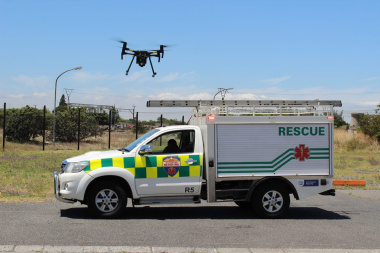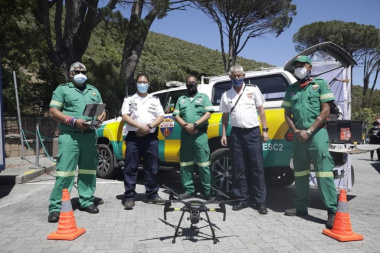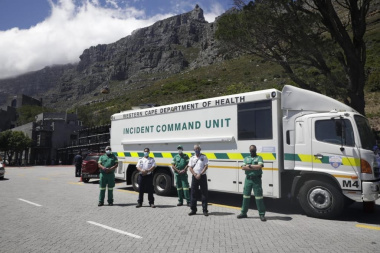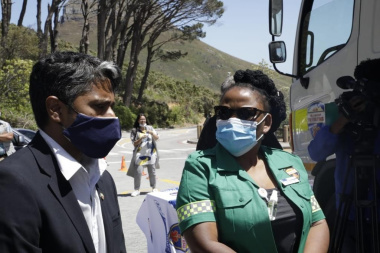
News
Western Cape EMS becomes first government institution to obtain a drone license
The Western Cape Government Health’s (WCGH’s) Emergency Medical Services (EMS) have become the first government institution in South Africa that will be allowed to fly drones legally which includes flying over public spaces, roads, people and national key points (with permission from landowner or its representatives) after obtaining a Remote Pilot Aircraft Systems Operators Certificate (ROC) from the South African Civil Aviation Authority (SACAA). Time is critical in any emergency medical situation and utilising drones when responding to such incidents will minimise the risk of fatalities or the chances of injuries becoming worse.
The process of investigating the possibility of using drones during EMS’ search and rescues began in January 2017. The project was initiated by Dr. Shaheem de Vries, Director of EMS, who appointed Fabian Higgins, Rescue Base Shift Manager and light aircraft pilot as the project leader. After three years, the process has been completed and the SACAA processed and issued EMS’ documentation. The purpose of the project is to utilise drones during search and rescue incidents such as drowning incidents, mountain rescues and diving incidents, as well as other major emergency incidents on highways and train incidents, training, assisting the department with inspections and during major events where there are lots of patients. “When responding to mountain calls and sea rescues, we usually utilise helicopters. The drones will assist when adverse weather prevents use of helicopters in certain areas,” says Fabian Higgins, EMS Drone Project Leader.
“We are pleased to introduce the Drone project to the province. The efficiency of EMS services is focused at the judicious and effective use of scares and highly skilled resources. The use of Drone technology in such an environment will advance our capabilities while ensuring that we honour our constitutional promise. This is a welcoming development, particularly as we encourage our citizens to participate in socially distanced and safe outdoor activities.” says Dr. Shaheem de Vries.
There’s a total of five pilots who are involved in the project - Fabian Higgins; Jason Higgins; Mark Webster; Zane Johnson and Carlo Adonis, who have undergone extensive training in Johannesburg to complete the SACAA requirements for drone operating qualifications and skills. A drone pilot course had to be completed by the pilots in Cape Town as well. The course was provided by a local training school, Drone-X, an SACAA approved drone training school that provides highly professional courses for drone pilots.
The WCGH’s EMS will utilise the Dji Matrice 200 Version 1, a high-performance drone, built to endure and able to fly in adverse weather conditions. It possesses anti-magnetism technology and as a result, aerials and electric wires will not affect the operation of the drone. A thermal imaging camera that will enable the team to see heat signatures during the day and at night will be used. The camera picks up different heat signatures, this will result in coherent sea rescues. Although the drone project will change the manner in which EMS’ rescue operations are carried out, aircrafts will receive priority. Should there be any aircraft in the same vicinity, the drone pilot will land and wait for the manned aircraft to leave the area. EMS has also been approved to fly in “controlled airspace” which allows the team to fly within 10km of any registered airport, following permissions on the day, by relevant air traffic control.
“As a department which prides itself on innovation in healthcare, we are continually exploring new ways and creating strategies that will improve our service to communities in the Western Cape. The EMS’ Drone Project will revolutionise the manner in which search and rescue incidents are conducted, particularly as we move into a period when the contributions of our men and women in green will be paramount. As many residents and visitors will be hiking, fishing and swimming, undesirable incidents can happen without warning. We urge people to always exercise caution and follow COVID-19 safety measures. Therefore, we look forward to a timeous and cost-effective method of attending to incidents that are out of reach,” says Dr Nomafrench Mbombo, Minister of the Western Cape Department of Health.
Deanna Bessick
Emergency Medical Services & Forensic Pathology Services
Cell: 073 620 4694









